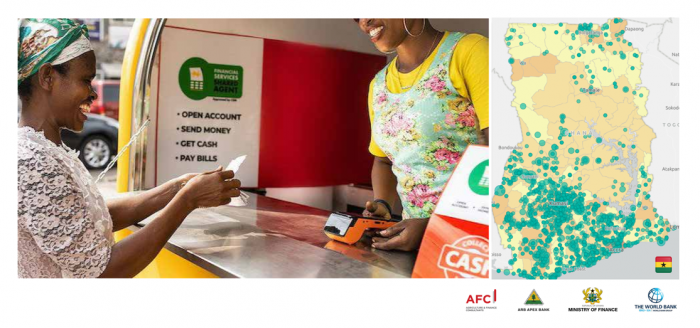
Between November 2020 and May 2021, as part of the World Bank’s Financial Sector Development Project in Ghana[1], AFC Agriculture and Finance Consultants GmbH assisted ARB Apex Bank (ARB)[2] in its agency banking initiative.
The Rural Community Banks (RCBs) are the main providers of formal financial services to the low-income un- or under-banked population segment of the economy living in the rural communities of Ghana, which, most often, lack reliable technology infrastructure like telecommunication and internet connectivity.
AFC was tasked to design an effective distribution channel for financial services that would reach under-served rural communities on a shared interoperable agency banking platform. The outcome sought to further promote the cash-light culture at each single agent location across the RCBs network.
The main objectives of the assignment were to: design agency banking business model; map potential agents’ locations throughout the country; and provide technical assistance for branding, advertising, consumer education and industry sensitisation on agency banking.
Despite the wide spread of COVID-19 pandemic around the continents, the AFC team was able to conduct on-site in-depth interviews with key representatives of various departments at ARB as well as with the management of the selected RCBs. Additionally, online surveys were developed and distributed among the RCBs, in order to collect the necessary quantitative data regarding their markets and technological infrastructure, marketing and branding activities, etc.
In order to develop an agency banking business model, tailored to the specific characteristics and business realities of ARB Apex Bank (ARB), as well as to the needs of all types of RCBs it serves, the experts considered the specific expectations, requirements, limitations and boundaries that were identified. As such, heterogeneous network connectivity, limited bankcard deployment, limited customer digital proficiency, multitude and heterogeneity of the involved stakeholders, adaptability and scalability of the proposed solution, simplicity of the processes, etc. The model was preliminarily discussed during a 2-days workshop in Kumasi, where the top management and the key staff of ARB and most of the member RCBs attended from all the regions of Ghana.
The developed model is based on a central application (platform) hosted by ARB and connected to the core banking system (CBS), containing the transactional data of all the RCBs. The platform is interoperable, allowing customers of any RCB to transact with any agent registered on it, regardless of which RCB the agent belongs to. It is using Unstructured Supplementary Service Data (USSD) protocol as the main means of communication, allowing connection to it, using the widely spread types of devices – mobile phone and smart-POS (Point Of Sale). In addition, the agents who are equipped with a computer or a laptop can use a web application in order to initiate transactions.
Considering the different layers embedded in the model and the fact that these layers do not carry the same implementation complexity, it was advised to organize the implementation of the platform in multiple phases, allowing a faster time-to-market and reducing budgetary and time constraints of the deployment.
As part of the deliverables package, the AFC team has provided the necessary guidelines, policies and procedures documents on agents’ selection, enrolment and monitoring, as well as the minimum business functional requirements specifications for the agency banking platform to be selected by ARB later. The team provided a comprehensive database, containing the geolocation of potential agent points throughout the country, aiming to achieve the most economically feasible spread of RCBs’ agent network in the regions of Ghana.
In addition, the experts have developed the strategy documents for branding and advertising, consumer education and industry sensitisation for a successful ARB’s centralised interoperable agency banking deployment.
At the end of the assignment, the AFC team has provided training sessions to key staff of ARB and selected RCBs, aiming to disseminate the knowledge on agency banking among the staff of the other RCBs, which will enrol onto the agency banking platform later on.
[1] The Ministry of Finance of Ghana has received financing from the World Bank toward the implementation of the Ghana Financial Sector Development Project, pursuing the objective of financial sector soundness and access to financial services by individuals.
[2] The ARB, established with support from the World Bank in 2002, has branches located in the majority of the regional capitals, serving more than 6 million accounts of 145 licensed member Rural Community Banks (RCBs). Its core mandate is the delivery of support services to the RCBs, complementing the supervisory role of the Bank of Ghana.
For further information, please contact Vladislav Nimerenco (Vladislav.Nimerenco [at] afci.de).
